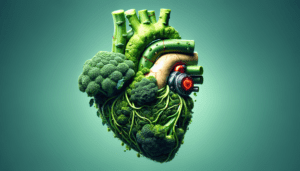The Power of Broccoli
Nutrient Profile of Broccoli
Broccoli is a powerhouse of nutrients, making it a staple in any healthy diet. This cruciferous vegetable is packed with vitamins, minerals, and beneficial plant compounds. Here’s a look at what makes broccoli so nutritious:
| Nutrient | Amount per 1 Cup (90g) | % Daily Value (DV) |
|---|---|---|
| Calories | 35 | – |
| Fiber | 2.6g | 10% |
| Vitamin C | 81mg | 90% |
| Vitamin K | 92mcg | 115% |
| Iron | 0.7mg | 4% |
| Potassium | 288mg | 6% |
| Folate | 57mcg | 14% |
| Calcium | 43mg | 4% |
Broccoli also contains smaller amounts of other essential nutrients, including magnesium, phosphorus, and zinc. For a more detailed breakdown, visit our page on the nutritional value of broccoli.
Health Benefits of Broccoli
The health benefits of broccoli are numerous, thanks to its rich nutrient profile and high antioxidant content. Here are some of the key benefits:
Cancer Prevention
Broccoli contains compounds like isothiocyanates and sulforaphane, which have been shown to reduce oxidative stress and may help prevent various types of cancer (Medical News Today). For more info, check out our detailed article on broccoli and cancer prevention.
Heart Health
The antioxidants and fiber in broccoli contribute to heart health by lowering cholesterol levels and reducing inflammation. A diet rich in broccoli can help manage blood pressure and reduce the risk of heart disease. Explore more about broccoli and heart health.
Bone Health
Broccoli is an excellent source of vitamin K and calcium, both of which are essential for maintaining strong bones. These nutrients help prevent osteoporosis and improve bone density. Learn more about broccoli and bone health.
Digestive Health
The high fiber content in broccoli aids in digestion and promotes regular bowel movements. It helps maintain a healthy digestive tract and reduces the risk of colon cancer (Medical News Today). Read more about broccoli and digestion.
Immune Support
Broccoli’s high vitamin C content supports the immune system, helping to fend off illnesses like the common cold and more severe conditions such as cardiovascular disease (Medical News Today). For more details, visit our page on broccoli and immune support.
These are just a few of the many benefits of incorporating broccoli into your diet. Whether you’re looking to boost your immune system, improve your heart health, or support your bones, broccoli is a versatile and nutritious choice. For more information, explore our comprehensive guide on the health benefits of broccoli.
Vitamins and Minerals in Broccoli
Broccoli is a nutrition powerhouse, offering an array of vitamins and minerals essential for overall health. Two of the most notable vitamins found in broccoli are Vitamin C and Vitamin K.
Vitamin C and Its Benefits
Vitamin C is a vital nutrient found abundantly in broccoli. It plays a crucial role in various bodily functions, including supporting the immune system, collagen production, and skin health. Vitamin C can help prevent conditions like cancer, cardiovascular disease, cataracts, and anemia. It may also reduce the symptoms of the common cold and shorten its duration.
| Nutrient | Amount per 76g (1 cup) | Daily Value (%) |
|---|---|---|
| Vitamin C | 51 mg | 45-54% |
Broccoli’s high Vitamin C content contributes significantly to its health benefits, making it a valuable addition to any diet.
Vitamin K for Bone Health
Vitamin K is another essential nutrient present in broccoli, crucial for maintaining strong bones and preventing osteoporosis. This vitamin plays a key role in bone metabolism and helps in the binding of calcium to the bone matrix.
| Nutrient | Amount per 76g (1 cup) | Daily Value (%) |
|---|---|---|
| Vitamin K | 92 µg | 64-86% |
Consuming broccoli can significantly contribute to your daily Vitamin K intake, aiding in bone health and reducing the risk of bone-related diseases.
Broccoli is also rich in other nutrients such as dietary fiber, iron, and potassium. For more information on the nutritional value of broccoli, visit our detailed guide.
Incorporating broccoli into your diet can provide numerous health benefits, from boosting your immune system to maintaining strong bones. For those interested in specific health benefits, check out our articles on broccoli and heart health and broccoli and cancer prevention.
Antioxidants and Anti-inflammatory Effects
Broccoli is renowned for its rich content of antioxidants and anti-inflammatory compounds. These elements play a crucial role in promoting health and preventing various ailments.
Sulforaphane and Its Role
Sulforaphane is a potent compound found in broccoli. It belongs to a group of phytochemicals known as glucosinolates. Upon consumption, sulforaphane is released and has been shown to exhibit antibacterial activity against Helicobacter pylori, a bacterium linked to gastric ulcers and gastrointestinal infections.
The antioxidant properties of sulforaphane help protect cells from oxidative damage caused by free radicals. This protection reduces the risk of chronic diseases, making broccoli a valuable addition to a health-conscious diet. Sulforaphane’s role extends to supporting heart health by lowering cholesterol, maintaining healthy blood pressure, and improving cardiovascular function (PubMed Central). For more insights on how broccoli benefits heart health, visit broccoli and heart health.
Anti-inflammatory Compounds in Broccoli
Broccoli is also rich in various bioactive compounds that possess significant anti-inflammatory effects. These compounds include quercetin, indole-3-carbinol, and kaempferol. Studies have shown that consuming broccoli can lead to a reduction in markers of inflammation, highlighting its potential to combat inflammatory conditions.
Here is a table summarizing the key anti-inflammatory compounds in broccoli and their effects:
| Compound | Effects |
|---|---|
| Sulforaphane | Antibacterial, antioxidant, supports cardiovascular health |
| Quercetin | Reduces inflammation markers, antioxidant |
| Indole-3-carbinol | Anti-inflammatory, supports cellular health |
| Kaempferol | Anti-inflammatory, reduces inflammation markers |
Consuming broccoli as part of a balanced diet can help manage inflammation and promote overall health. For more information on how broccoli contributes to various health benefits, explore our article on the health benefits of broccoli. If you’re interested in how broccoli impacts specific conditions, check out broccoli and cancer prevention and broccoli and blood pressure.
Broccoli and Disease Prevention
Cancer-fighting Properties
Broccoli is widely recognized for its potential cancer-fighting properties. This cruciferous vegetable contains compounds like isothiocyanates, particularly sulforaphane, which can act against cancer formation at a molecular level by reducing oxidative stress. Sulforaphane has been found to inhibit the growth of cancer cells and induce apoptosis in various types of cancer, including breast, prostate, lung, and colorectal cancers (PubMed Central).
In addition to sulforaphane, broccoli is rich in indole-3-carbinol, another compound that helps prevent cancer by combating cell damage that leads to cancer. Research suggests that consuming whole, fresh broccoli provides more health benefits compared to supplements (Medical News Today).
| Compound | Potential Benefits |
|---|---|
| Sulforaphane | Inhibits cancer cell growth, induces apoptosis |
| Indole-3-carbinol | Combats cell damage that leads to cancer |
For further details on how broccoli can aid in cancer prevention, visit our page on broccoli and cancer prevention.
Heart Health and Cholesterol Management
Broccoli offers numerous benefits for heart health and cholesterol management. The antioxidant and anti-inflammatory properties of broccoli, including compounds such as sulforaphane, quercetin, and indole-3-carbinol, contribute to cardiovascular health by helping to lower cholesterol, maintain healthy blood pressure, and improve overall cardiovascular function (PubMed Central).
Sulforaphane, in particular, plays a significant role in protecting the heart. It helps to reduce inflammation, which is a key factor in the development of heart disease. Additionally, the fiber content in broccoli aids in lowering cholesterol levels by binding with cholesterol in the digestive tract and preventing its absorption.
| Benefit | Compound(s) Responsible |
|---|---|
| Lowering Cholesterol | Fiber |
| Reducing Inflammation | Sulforaphane, Quercetin |
| Maintaining Healthy Blood Pressure | Indole-3-carbinol |
To learn more about how broccoli supports a healthy heart, check out our article on broccoli and heart health.
In summary, the benefits of broccoli extend beyond basic nutrition, offering substantial support for disease prevention through its cancer-fighting properties and its positive impact on heart health and cholesterol management. For a comprehensive look at broccoli’s nutritional value, visit our page on the nutritional value of broccoli.



